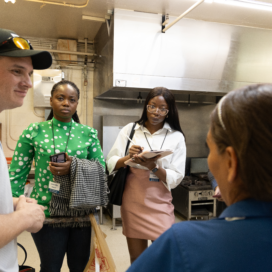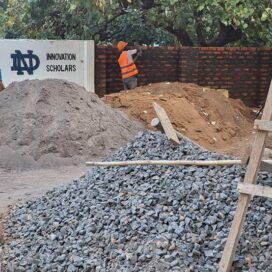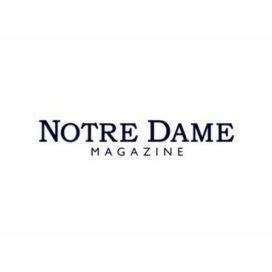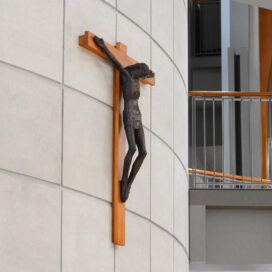Frontlines in America
Despite the pandemic, this new Notre Dame MBA course applies the power of business problem-solving to the economic and societal problems facing communities in the U.S.
Published: March 24, 2021 / Author: Carol Elliott

Listening to Chris Yura talk about his hometown in Appalachia is like fanning out a stack of double-exposed photos. Each one tells two stories.
One minute, Yura sounds like a glowing TripAdvisor review as he describes with evident bone-deep pride the beauty of the mountains, streams and woodlands.
“I think the thing that strikes people when they first come to West Virginia is just, one, how beautiful it is and, honestly, how very little development there is,” said Yura, a native of Morgantown, West Virginia, who played football for the University of Notre Dame from 1999 to 2003. “I’ve heard from so many people, ‘Wow, I thought you had to go out west to see this type of beauty.’ The natural beauty of our state is striking. And in the people, too, there’s a specific type of genuineness and authenticity that makes it very unique.”
But then, there’s the second image — the one that comes to mind perhaps most readily from media portrayals like the famous LIFE magazine cover in 1964 when President Johnson, touring Kentucky as part of his “war on poverty,” was famously photographed with an Appalachian family on their front porch.
“Yeah, I think you have to be realistic and you have to see that we have some poverty,” he said. “That stigma, though, has been very debilitating for our state, to the point that I think it’s almost forced the brain drain a little bit. People typically do not stay in West Virginia when they graduate high school or college. They typically leave. And part of the stigma that this is not a place to be.”
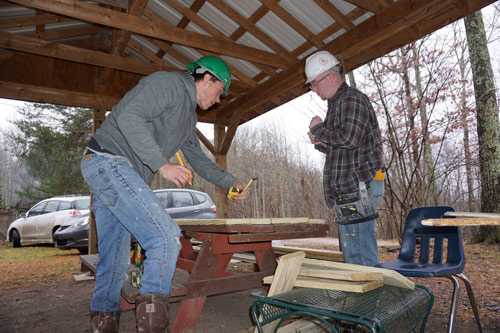 The dual-sided portrait that Yura paints of Appalachia is true of many of places across the U.S.: Once-vibrant communities that became gutted by economic and societal trends, dogged by drugs, crime and violence, yet still home to people with a strong sense of identity and culture who want better futures for themselves and their children.
The dual-sided portrait that Yura paints of Appalachia is true of many of places across the U.S.: Once-vibrant communities that became gutted by economic and societal trends, dogged by drugs, crime and violence, yet still home to people with a strong sense of identity and culture who want better futures for themselves and their children.
Yura founded SustainU, a sustainable apparel brand, which is now part of a family of social enterprises under Coalfield Development, a nonprofit organization that focuses on revitalizing Appalachia through workforce training and personal development. He harbors no delusions about Appalachia’s sizable and enduring challenges, which include chronic high unemployment, an escalating opioid crisis, fractured family life and stressed or failing social systems.
What he does harbor, however, is hope. “I think we have to be truthful about where we’re at, but that’s absolutely not the defining face of the reality of the region,” he said.
This effort to define — or redefine — the reality of a region lies at the heart of a partnership between Coalfield Development and a new University of Notre Dame MBA course, Frontlines in America.
ON THE HOMEFRONT
Frontlines in America (FIA) launched in fall 2020 as part of the Meyer Business on the Frontlines Program, which since its launch in 2008 has worked on more than 60 projects in 25-plus international settings in partnership with organizations ranging from government agencies to nonprofits to Fortune 500 companies.
FIA’s aim is to apply the same kind of business problem-solving approach to U.S. communities mired in poverty and economic and social brokenness. In partnership with organizations seeking to revitalize these communities, FIA seeks to develop sustainable solutions to intractable and enduring societal problems through the dynamic power of business.
While the COVID-19 pandemic prevented students from traveling to visit partners in the field, 2020 was a reminder of the importance of serving vulnerable communities in the United States.
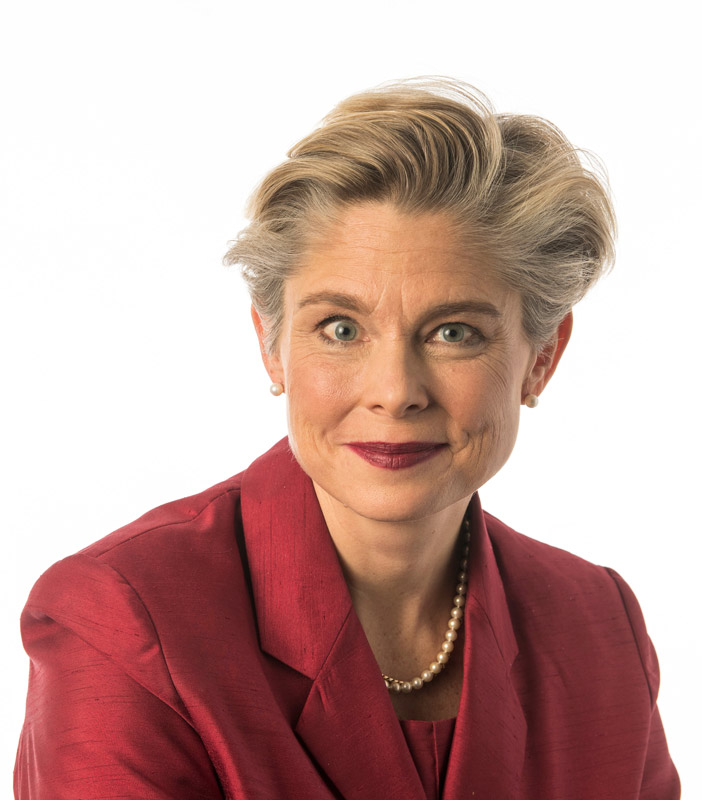
Viva Bartkus
“When you are stricken by poverty and something like COVID hits, you get decimated in a way that no one else does,” said Viva O. Bartkus, associate professor of management and the faculty director and founder of the Meyer Business on the Frontlines Program. “When you think about that, you also think about Appalachia or certain Native American reservations, or urban communities suffering from neglect, isolation and despair at a level that is un-American in my mind. To me, it’s a real priority to think about how we could recreate similar opportunities for the dignity of work to serve people here in the United States.”
Although FIA shares the same core mission, business problem-solving methodology, field experience, dialogue, and reflection as the international Business on the Frontlines (BOTFL) course, FIA has its own set of student learning objectives and unique themes given its focus on the barriers to work faced by many populations and geographies in the United States.
Where BOTFL is a full semester, six-credit hour course, FIA is a four-credit hour course. The course will be held during “Mod 1” or the first half of the fall semester plus the interterm week between the first two MBA mods.
And then there is the most obvious differentiation: BOTFL is international in scope where FIA focuses on projects in the U.S. It’s this point that presents some distinct facets to the course. Students study many of the same societal problems and apply the same research and problem-solving frameworks as they have in Guatemala or North Macedonia, for example; but in this case, they essentially will be in their own backyards.
“The biggest difference in my mind is that with Business on the Frontlines, you learn, you reflect, you have this journey of discovery, but you still come home,” said Bartkus. “You may love Palestine, and you may love our partner in Palestine, and you may be really transformed by meeting ‘the other.’ But you still come home.
“For Frontlines in America, the kind of deep, deep prejudice, bias or neglect, or just unfairness, should motivate people to think about social justice in a different way. We’re planning to take that head on. I think in some ways the discussions and maybe the outcomes might be a little bit more raw, because it hits so close to home,” she added.
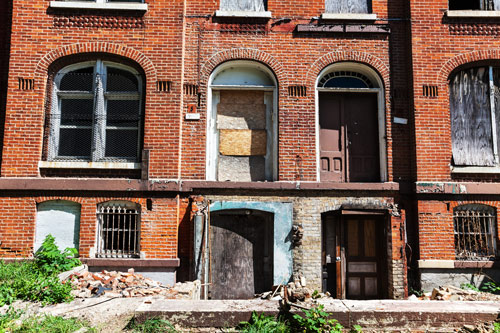 Bartkus, a former resident of Chicago, recalls driving through south side streets recently and seeing the abandoned houses, vacant lots and graffiti-sprayed parks. The scenes were not so different from what BOTFL teams commonly encountered in conflict-torn countries and regions suffering deep, endemic poverty. Bartkus’ constant mantra in viewing these seemingly hopeless situations offers a wayfinding beam of hope: “Never underestimate the human dignity associated with a good day’s work.”
Bartkus, a former resident of Chicago, recalls driving through south side streets recently and seeing the abandoned houses, vacant lots and graffiti-sprayed parks. The scenes were not so different from what BOTFL teams commonly encountered in conflict-torn countries and regions suffering deep, endemic poverty. Bartkus’ constant mantra in viewing these seemingly hopeless situations offers a wayfinding beam of hope: “Never underestimate the human dignity associated with a good day’s work.”
“As part of their own journey of self-discovery, students will advance soft skills like empathy and moral imagination and will have the experience of encountering ‘the other,'” said Kelly Rubey (MBA ’16), an assistant teaching professor of Management & Organization at Mendoza. “But by focusing solely on the context of our own country, we are given the chance to really consider the barriers to work here in the U.S.”
Bartkus, Rubey and Joe Sweeney (MBA ’12, ND ‘06), assistant teaching professor of Management & Organization, all teach in the Meyer program. (Read “An Expanded Vision” for more program updates.)
They also study American ideals such as resiliency. “As President Obama said, ‘Our country is always a work in progress,’ and we can continue to study the past to carry things forward in new and better ways,’” said Rubey. “I think that we’ll learn a lot as a program that will extend our impact and transform our students in new and different ways, as they become future business leaders.”
Fall 2020, of course, was a historically atypical semester. The COVID-19 pandemic was making everyday life difficult, including travel and group activities. Travel to work with the partners in their communities, which is an important part of the experience, wasn’t possible. Despite these obstacles, eight students were selected through a competitive application and interview process to serve in the inaugural class, drawing students from the MBA program, Notre Dame Law School, and the Master of Global Affairs program at the Keough School.
Faced with additional challenges due to travel and safety restrictions the teachers, students, advisors and partners found work-arounds. The class was able to meet in-person on campus. Students met with the partners and conducted interviews via Zoom. Four BOTFL alumni served as team advisors, taking personal time off work to join team meetings virtually.
The eight students split into two teams to work on two projects that in some ways seem worlds apart — one an urban youth center on Chicago’s southside and the other a workforce development nonprofit set in rural West Virginia.
URBAN FARMING IN CHICAGO
Team Chicago — students Elena Westbrook (MBA ’21), Sam Fioroni (MBA ‘21), Ilya Blay (MBA ’21) and Maria Murphy (JD ’22) and advisors Ann Elise Debelina (MBA ’16) and Kelly Strait (MBA ’13) — partnered with the Gary Comer Youth Center (GCYC). The center is located in the Greater Grand Crossing neighborhood, where the median annual household income is less than $30,000 and the life expectancy is six years below the city of Chicago’s on average.
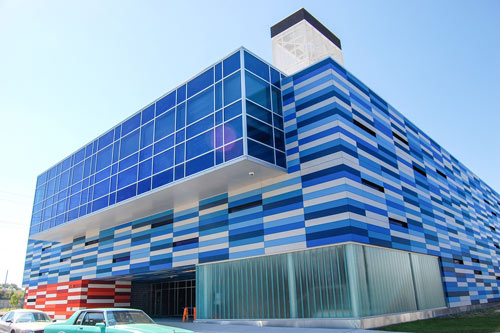
Gary Comer Youth Center
Greater Grand Crossing is a predominantly African American community with nearly 40% of its residents living in poverty. It faces many of the same issues that plague other high poverty areas in Chicago: high rates of unemployment and violent crime and a lack of access to high quality education, safe housing, updated infrastructure and affordable healthcare. In the neighborhood, 55% of households are at risk for food insecurity.
Five minutes into a Zoom conversation with executive director Rhonda Hopps and you discard any preconceived notions of a youth center as essentially a glorified after-school program. The Comer Center building resembles a modern art museum — open and airy, with student-created art installations decking halls and spaces with pops of energy, color and smart creativity. Hopps, a graduate of Stanford Business School, oversees 80 full- and part-time staff members. The center typically serves more than 2,000 middle and high school students in its various programs.
“One of my favorite conversations from this semester was during our interterm week. Rhonda told us the story of her building a new school during her previous tenure as a charter school network president,” said Maria Murphy. “She said that the school was designed, intentionally, to be state-of-the-art and beautiful. Rhonda recalled the students seeing the new school for the first time, astonished that this beautiful building was in their community and built just for them. By seeing this building, the students were given an important lesson in their worth.”
The center offers a dazzling array of project-based “STEAM” (science, technology, engineering, arts and math) learning opportunities. But what it really offers students is a vision for their future. “Our youth will graduate with a post-secondary plan, the skills and the mindset to achieve it,” said Hopps. “At the end, we really want them to have a path toward a sustainable future.”
“We are committed to preparing youth to be well-rounded global citizens who are ready for college and careers,” she said. “We do this by a research-based youth development philosophy so that our programs are integrated with students’ schools.”
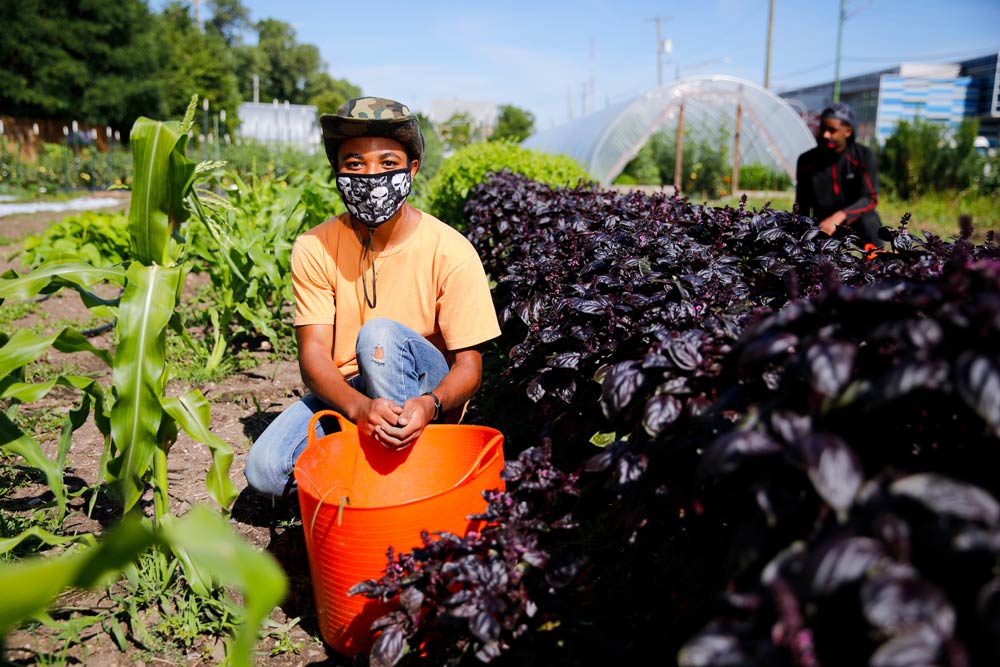 FIA’s partnership with the Comer Center is intended to be a multi-year collaboration. For the first phase, the team focused on creating an economic engine outside of fundraising. The aim is twofold: to provide a revenue source to support the center’s programs and operations and to utilize the power of business to impact the larger community.
FIA’s partnership with the Comer Center is intended to be a multi-year collaboration. For the first phase, the team focused on creating an economic engine outside of fundraising. The aim is twofold: to provide a revenue source to support the center’s programs and operations and to utilize the power of business to impact the larger community.
GCYC has a one-acre urban farm that produces more than 20,000 pounds of fresh fruits and vegetables every year. The farm serves as a resource both to educate youth on agribusiness and to provide access to nutritious foods to the neighborhood, addressing issues of food insecurity.
Hopps and former youth center director Ayoka Mota Samuels met with the FIA team weekly via Zoom and traveled to campus during the interterm week, bringing sample products from the urban farm to help give the students a taste of the work being done at Comer.
The FIA team analyzed opportunities to use the farm to create a social enterprise, which could continue to provide learning opportunities for the Center youth, address the neighborhood’s unmet market needs and provide sustainable revenue to the Center to extend its resources as it serves as a hub in the community.
In order to determine whether GCYC can generate sustainable revenue by selling products from its urban farm, the performed rigorous market analyses on representative products and explored whether other non-food items such as poinsettias potentially were high-profit complimentary offerings. Ultimately, FIA recommended that Center utilize the farm as a classroom for both the center and the extended community rather than a primary source of revenue through product commercialization. The collaboration also led to an identification of potential new revenue streams that would require minimal effort but will generate financial returns for the Center.
“In Frontlines in America, we learned to appreciate that it’s the journey that matters. Rhonda taught us that, while getting kids to graduate high school is central to their mission, it isn’t necessarily the only thing worth celebrating; the more powerful achievement is the lasting impact of all the learning and growing that happens while the youth reach for that outcome,” recalls Sam Fioroni.
TRANSIT IN THE MOUNTAINS
Meanwhile, Team West Virginia focused on a project that was in some ways a world away from Chicago’s urban landscape. Once home to booming mining operations, West Virginia has experienced significant economic hardship with the decline of the industry over several decades.
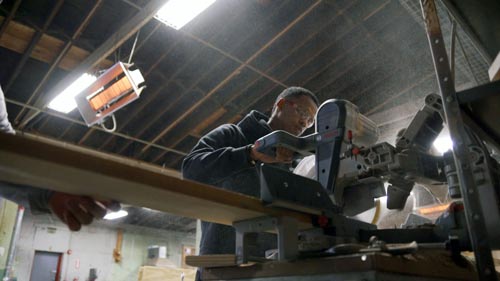 Today, while some counties have shown economic improvement, many still struggle with chronic unemployment as the traditional industries such as coal mining and textile manufacturing fell into decline. The rough terrain contributes further to isolation and a lack of public services and infrastructure, which perpetuate the conditions of poverty. Added to these challenges, the region is considered the epicenter for the opioid epidemic. The overdose mortality rates for people aged 25-44 (those in their prime working years) are 70% higher than the rest of the country.
Today, while some counties have shown economic improvement, many still struggle with chronic unemployment as the traditional industries such as coal mining and textile manufacturing fell into decline. The rough terrain contributes further to isolation and a lack of public services and infrastructure, which perpetuate the conditions of poverty. Added to these challenges, the region is considered the epicenter for the opioid epidemic. The overdose mortality rates for people aged 25-44 (those in their prime working years) are 70% higher than the rest of the country.
FIA Team Appalachia working with Yura and Coalfield Development included students Lauren Jessup (MBA ’21 , Su Li (MBA ’21), Jaclyn Biedronski (MGA ’21), Eryn Pollard (JD ’22) and advisors Tom and Stephanie Georgevits (both MBA ’17). Coalfield is based in Wayne, West Virginia, which sits on the far west side of the state near the borders of Kentucky and Ohio.
Yura has kept close ties to the University since his graduation and expected to welcome the FIA team to West Virginia during the interterm break to work with his Coalfield colleagues. Instead, he packed a container with pepperoni rolls — an iconic food of the coal miners — and headed to the Notre Dame campus to give the students a taste of the Appalachian region and its history. Coalfield CEO Brandon Dennison also devoted a significant amount of time meeting with students via Zoom throughout the semester.
“Coalfield Development uses a workforce development model to get people back to work that have been either laid off from the coal mines or are coming out of recovery,” said Yura, who has worked with Coalfield since he sold his textile business, SustainU, to the nonprofit in 2017. “They essentially empower these individuals to go back to school and eventually back to work.”
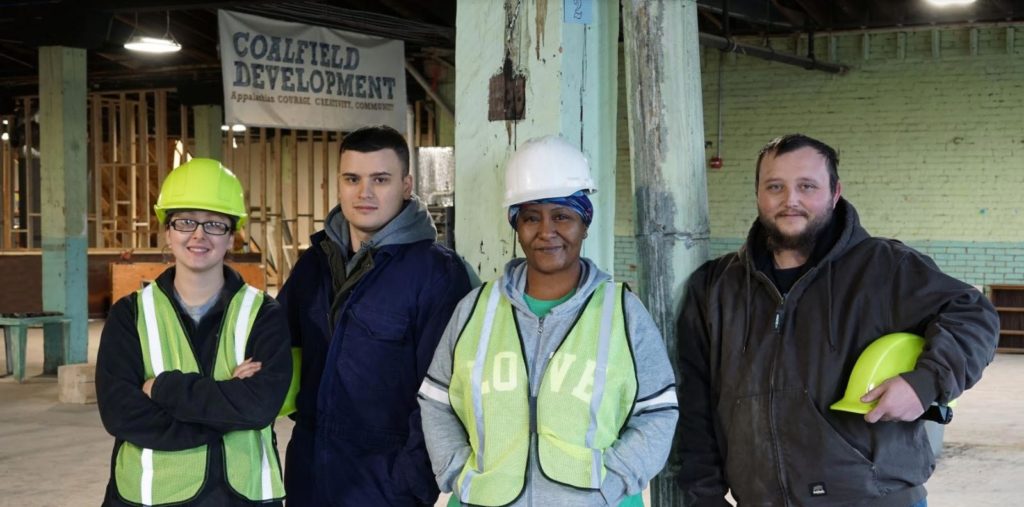 While individuals are in school, Coalfield employs them using what is called the 33-6-3 model, explained Yura. This means they work 33 hours a week, go to school six hours a week and devote three hours a week to life-skills training. The model involves lending a hand, but doing so through helping people develop the skills and education they need to escape the cycles of poverty, addiction and crime that have held them back.
While individuals are in school, Coalfield employs them using what is called the 33-6-3 model, explained Yura. This means they work 33 hours a week, go to school six hours a week and devote three hours a week to life-skills training. The model involves lending a hand, but doing so through helping people develop the skills and education they need to escape the cycles of poverty, addiction and crime that have held them back.
Team member Su Li reflects, “Poverty in America takes many tolls: not only lack of money, but also lack of social capital, adversary childhood experiences, insecurity, hopelessness and so on. It is a vicious cycle and people who are inside need support to break out. Coalfield offers people in West Virginia that opportunity.”
“With kind of the coal industry fallout and the opioid crisis, this region needs industries that have a triple bottom line approach,” said Yura. “It’s one thing just to give somebody a job, but if somebody is in a cycle of addiction or other things, it’s just not going to be enough. So Coalfield Development is essentially a way for people to kind of reenter the workforce using a different method.”
One common challenge to sustained employment is the lack of a transportation network to provide access to jobs, services and markets for those living in these remote communities. Coalfield asked the FIA to provide both an analysis of a transportation solution to connect goods and products to markets as well as to provide people with access to jobs.
As the team analyzed the data and commenced interviews, the students also looked more deeply into potential solutions. They realized that Coalfield had two additional challenges to easily accessible transportation:
- Trainees lack access to financial savings and therefore faced transportation issues that were more complex than simply access to a car. For example, without savings, they also lacked emergency funds for car repair and upkeep.
- Coalfield lacked brand recognition and had a limited distribution of products, which prevented the organization from achieving economies of scale.
The solutions, then, focused less on physical transportation than more on providing financial literacy and incentive programs as well as establishing more effective e-commerce platforms to gain market share and customer recognition.
“Notre Dame has been very interested and invested in Appalachia in one way or the other since at least the ’60s,” said Yura. “But I think that our partnership with Frontlines has solidified the importance of Notre Dame’s role in a different way. The types of relationship we’re building with Frontlines in America is what is really going to help move the needle here. It’s a commitment of time with a very deep dive of expertise with very talented individuals that have life experiences and business experience that really can help shape and shift an organization like ours.”
AT THE JUNCTURE
While COVID restrictions provided unique challenges in 2020, it also created new opportunities for innovation. While the students and their advisers and professors normally would have traveled to the partner locations in October, this year, the partners traveled to campus for a few days to spend time with the students. For the first time, partners were able to meet each other and share experiences, insights, and best practices in addition to working directly with the student teams.
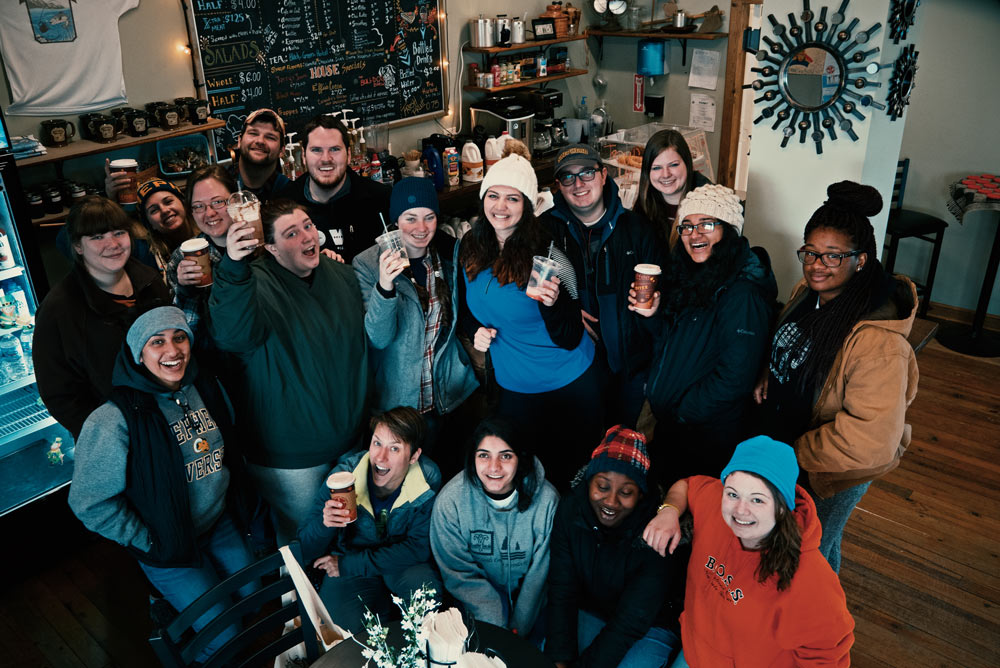 Eventually, in a post-COVID semester when life returns to “normal,” the Meyer Business on the Frontlines teams will be able to travel freely again, encountering the people whom they serve face-to-face. The practice of having partners visit campus to meet their teams and each other will continue in some form.
Eventually, in a post-COVID semester when life returns to “normal,” the Meyer Business on the Frontlines teams will be able to travel freely again, encountering the people whom they serve face-to-face. The practice of having partners visit campus to meet their teams and each other will continue in some form.
Frontlines in America looks forward to continuing to serve in West Virginia and on the South Side of Chicago in collaboration with the Comer Youth Center and Coalfield Development in future iterations, while welcoming new partners that serve other communities facing barriers to work, such as former gang members, refugees, and indigenous groups.
For Bartkus, ever attuned to the impact on the individual of a Frontlines experience, one of the program’s objectives comes down to instilling a deep understanding in students of a fairly straightforward tenet: Service is a privilege.
“Once you walk the tenements and look at what kind of services get provided, what kind of educational opportunities there are, and what kind of job opportunities there are, you can’t unsee that,” she said. “We are a work in progress trying to create a more perfect union the way our country’s founders laid out. You have to be part of the process in each generation to create a more perfect union. And I really think that business has a very big role in that, in creating the jobs, in creating the opportunities for the dignity of work.”

